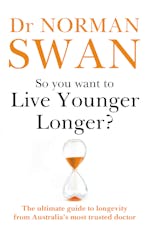.png?auto=compress&w=1040&h=380&fit=crop&fm=jpg)
So you want to be more active?
THURSDAY 21 JUL, 2022The ultimate guide to exercise from Dr Norman Swan, author of So You Want To Live Younger Longer?
Outrunning the clock – staying young with exercise
Before I dive deep, it’s probably time to step back and look at what I’ve talked about a few times, namely homeostasis. It’s the balance of forces in our bodies and when everything’s in harmony and in its place, we have health and wellbeing. When homeostasis is knocked off its ledge, all sorts of things happen.
When balance is lost in our blood fats or control of blood pressure, we get heart disease. When balance is lost in blood sugar control and body fat, we get diabetes. And when balance is lost at the cellular level, we lose our youth and turn into biological degenerates. Some experts have argued that ageing is a disruption of homeostasis. So starting young is about shoring up the balance.
Stay with me on this because it helps to explain why exercise is so potent.
One group of researchers has argued that, at a cellular level, there are nine interrelated features of ageing all of which throw us off balance and stuff up homeostasis: our genome – our genes and DNA – becomes unstable; our telomeres lose control of their length and start to erode, leaving our chromosomes exposed; our genes alter their shape and structure and therefore their function (epigenetic changes); we don’t monitor and respond to nutrients in our diet as well (nutrient-sensing – the mTOR pathway, in fact); we get imbalances in protein production (loss of proteostasis); our energy factories – the mitochondria – become dysfunctional; our cells become senescent; the stem cells which make new tissue clap out; and finally, cells don’t talk to each other as well as they used to.
It’s like the control room at the ill-fated Chernobyl nuclear power station (did you see the series, by the way?). One shitty thing after another happens because the underlying system falls apart and then it’s a pathway to meltdown because these mechanisms of ageing are all about causing damage and responding badly to damage, and the net result is loss of homeostasis. To stay young, you’ve got to keep the underlying system in good shape and the forces of destruction counterpoised with the forces for good.
And exercise is great at that.
HIIT vs MIT: HIIT is high intensity interval training and MIT is moderate intensity training. Most recommendations land on 45–60 minutes of MIT on most days of the week mixed with muscle-strengthening exercises. There are various protocols for HIIT but they generally involve 20 or 30 seconds of going flat out (sprints) followed by recovery time, repeated several times. Probably best done under supervision until you get it right and do it sensibly. The point is that HIIT and MIT both improve cardiorespiratory fitness to a similar extent. It’s just that HIIT does it in less time each week.
The more the better, up to a point: There’s lot of debate about whether there’s a maximum amount of exercise beyond which you don’t get additional benefits. Some believe that 50 MET hours a week is the upper limit, assuming you’re not training for the Olympics. My advice is worry about the limit when you get there although a recent study from Denmark suggests that when it comes to sports exercise, 10 hours a week might be getting too much.
Never too late: Interestingly, the gain in years of life doesn’t seem to be closely tied to the age at which you start exercising – there are extra years available regardless of age.
Do it daily: Here’s why it needs to be daily rather than loading up your METs for the weekend. Think of exercise as a medication that only lasts in your body for a certain time. For example, you need to take antibiotics every six or eight hours because the body has eliminated a significant proportion of the earlier dose by then. With exercise, the benefits in terms of the cellular effects and, say, reductions in blood pressure may only last a day or two, at which point you need another dose to get you back on track, so to speak. Don’t keep all your METs for the weekend.
Dietary restriction needs exercise: According to anti-ageing expert Professor Luigi Fontana, exercise is a really important component of dietary restriction for all the reasons above plus avoiding your background calorie burn dropping. It’s another example of homeostasis at work where if you lower your calorie intake your body adjusts and lowers your metabolic rate to compensate. Exercise keeps up the calorie ‘burn’. What about your step count? The above gives you a better guide to exercise levels but if you’re into step counting, the cutoff for avoiding premature death appears to be 7000 steps a day or more, from a recent US study at the time of writing.
Related news
 loading...
loading...
Start reading The Librarians of Rue de Picardie
Read an exclusive extract! From the bestselling author of THE PARIS LIBRARY.
 loading...
loading...
The Richell Prize Celebrates its Tenth Anniversary Year
Announcing the opening of entries for The Richell Prize 2024.
 loading...
loading...
Mum loves books this Mother's Day!
 loading...
loading...
Start reading Small Hours by Bobby Palmer
Start reading Small Hours by Bobby Palmer
 loading...
loading...
Read an exclusive extract from All the Colours of the Dark
Dive into Chris Whitaker's unputdownable, All the Colours of the Dark.



.png?auto=compress&w=150&h=60&fit=crop&fm=jpg)



.png?auto=compress&w=150&h=60&fit=crop&fm=jpg)

